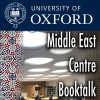Making Film in Egypt
Professor Walter Armbrust (St Antony's College, Oxford) chairs the discussion.
The book is available for purchase from the book distributors of the publisher, email: IPSUK.orders@ingramcontent.com and quote discount code AUCPRESS20 for your 20% discount. Offer available until 31st July 2021.
Chihab El Khachab is a British Academy Postdoctoral Fellow at the Faculty of Asian and Middle Eastern Studies, University of Cambridge. He holds a DPhil in Anthropology from the University of Oxford (2017), and was a Junior Research Fellow in Christ Church, Oxford, between 2016 and 2020. His first book, Making Film in Egypt: How Labor, Technology and Mediation Shape the Industry, was published by the American University in Cairo Press in 2021. His broader research interests include Egyptian popular culture, technology, humor, and bureaucracy.
Professor Walter Armbrust is a Hourani Fellow and Professor in Modern Middle Eastern Studies. He is a cultural anthropologist, and author of Mass Culture and Modernism in Egypt (1996); Martyrs and Tricksters: An Ethnography of the Egyptian Revolution (2019); and various other works focusing on popular culture, politics and mass media in Egypt. He is editor of Mass Mediations: New Approaches to Popular Culture in the Middle East and Beyond (2000).
Extract from publisher’s website:
The enormous influence of the Egyptian film industry on popular culture and collective imagination across the Arab world is widely acknowledged, but little is known about its concrete workings behind the scenes. Making Film in Egypt provides a fascinating glimpse into the lived reality of commercial film production in today’s Cairo, with an emphasis on labor hierarchies, production practices, and the recent transition to digital technologies. Drawing on in-depth interviews and participant observation among production workers, on-set technicians, and artistic crew members, Chihab El Khachab sets out to answer a simple question: how do filmmakers deal with the unpredictable future of their films? The answer unfolds through a journey across the industry’s political economy, its labor processes, its technological infrastructure, its logistical and artistic work, and its imagined audiences. The result is a complex and nuanced portrait of the Arab world’s largest film industry, rich in ethnographic detail and theoretical innovations in media anthropology, media studies, and Middle East anthropology.
Join us for our MEC live webinars – registration essential; details available from Middle East Centre Events | St Antony's College (ox.ac.uk) or subscribe to our weekly e-mailing newsletter by emailing mec@sant.ox.ac.uk or follow us on Twitter @OxfordMEC




